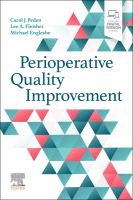Physical Address
304 North Cardinal St.
Dorchester Center, MA 02124

Key Points Understanding the chief executive officer (CEO) mindset and what they worry about helps teams frame performance improvement initiatives in ways that will resonate. Proposed quality improvement projects should ideally have direct ties to an organization's strategic plan or…

Key Points Sustainable quality improvement (QI) aims to deliver care that maximizes positive health outcomes through best use of environmental, social, and financial resources. Average global temperatures on earth are rising because of human activity. The US healthcare industry produces…

Key Points Certified registered nurse anesthetists (CRNAs) are well positioned within the perioperative care model to provide high-quality care throughout the surgical continuum. Many areas of practice within the profession of nurse anesthesia, including background, training, and personal care delivery,…

Key Points Evidence-based medicine, quality improvement (QI), and clinical research are three cornerstones of perioperative nursing. Nurse education and empowerment is crucial to ensure best practice. Multidisciplinary teamwork is essential for optimal patient care. Communication is key among all perioperative…

Key Points Resilience is needed, both individually and for an organization. To improve staff resilience, promote a culture of wellness in the organization and include executive buy-in. Developing data on risk of burnout in staff, using validated inventories, can help.…

Key Points The National Emergency Laparotomy Audit (NELA) collects perioperative data on patients undergoing emergency bowel surgery (emergency laparotomy) from 179 hospitals across England and Wales (2020 figures). Data are used nationally, providing real time hospital-level benchmarked performance reports and…

Key Points A multidisciplinary group convened to create a standardized protocol for outpatient total shoulder replacement based on available evidence. The use of regional anesthesia and analgesia provides superior postoperative analgesia for total shoulder replacement (TSR) compared with general anesthesia…

Key Points More older patients with multiple cardiovascular comorbidities, previous surgery, and other diseases associated with aging are presenting for major surgery. Cardiac risk stratification is key to advise the patient on the risks and benefits of surgery and inform…

Key Points The Agency for Healthcare Research and Quality (AHRQ) Safety Program for Improving Surgical Care and Recovery (ISCR) was launched in 2016 and aimed to accelerate adoption of enhanced recovery principles across five surgical areas using the principles of…

Key Points The perioperative medicine for older people (POPS) team at Guy's and St Thomas’ National Health Service (NHS) Trust (GSTT) has pioneered an award-winning perioperative medicine service model and informed the development of similar services in the United Kingdom.…